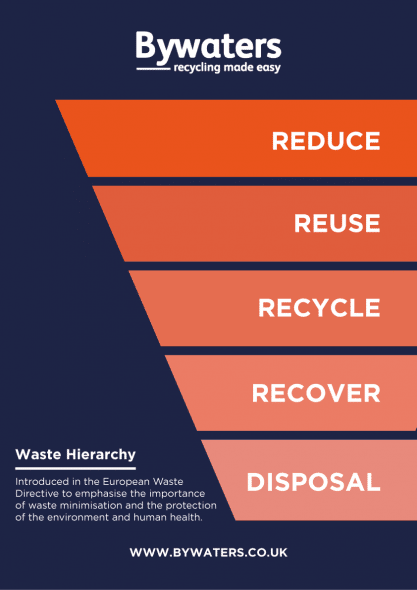Contact us today for your Free Quote
Bow School is a staple in Tower Hamlets, standing as one of the largest educational institutions in the borough. As one of the winners of the Builders Future Fund, Bow School is constantly displaying evidence of its commitment to a better tomorrow. Our building and Bow School are a walking distance from each other, with both organisations focused on the future of our planet from different vantage points. At Bywaters, we’re committed to supporting our community, through a circular approach.
The task
Encouraging young people to recycle can be a difficult task, however, as we’ve found through our own research, when you provide them with accessible resources and a consistent, yet simple, pattern they can become very effective. Recent studies have shown that over 65% of young people are visual learners. Therefore, the more bins available, the more chance items will be recycled appropriately.
One of the biggest challenges to improving the waste management practices of one of Tower Hamlets largest schools is the visibility and accessibility of bins. When young people see a variety of bins around them, it challenges them to include proper recycling in their daily habits. Essentially, the closer people are to waste containers at any given point, the easier it is for them to utilise them while building a positive habit. This is where we come in. As London’s most reliable waste management company, Bywaters is committed to supporting buildings and businesses around us.
The solution
At Bywaters, we have been working on building a circular economy for the last few years. The purpose of a circular economy is to build a network of resources that are repurposed rather than recycled. Through our partnerships, we constantly ensure that items are reused where possible.
This entails repurposing equipment from our own building and our clients for those that may need it. This is something we also do to support buildings and businesses within our area. We’ve previously utilised our circular approach to provide Bow School with 32 office desks, accompanied with chairs and draws in 2022. This time, our focus is on the supporting Bow Schools own commitment to improving its recycling rate and habits. The team do all they can to educate over 1000 students on best waste practices, however, with more bins on site, it will give those young people the perfect opportunity to practise these principles. That’s where we step in.
The Outcome – 2020 Vision
At Bywaters, we ensure our circular economy stretches beyond our own building, by repurposing the resources of our clients. One of our most successful partnerships is 20 Fenchurch Street, not only for its consistent growth in recycling practices, but also for the team’s commitment and application to building an environmentally friendly City with us.
Upon conversations with Bow School, we concluded that the best way to improve the recycling rate is to increase the number of bins available to students. Kennedys Law Firm, the occupants at 20 Fenchurch Street kindly responded by donating 20 Bywaters’ branded internal bins to our friends at Bow School.
The bins included seven grey bins (for general waste), seven yellow bins (for plastic), and six red bins (for aluminum). The delivery was made by Phoebe, the head of our team of sustainability specialists, on our electric dustcarts.
As a family-owned recycling company, there are many things we value, two of which are – community and sustainability.
The Waste Hierarchy
There’s a framework that is followed to make sure waste is managed the right way. The Waste Hierarchy system was introduced in 1975 by the European Waste Directive. It ranks different actions someone has when assessing what to do with items that can be potential litter.
It is a framework designed to outline the most and least desirable options available to minimise waste, protect the environment, and potentially prevent excess carbon emissions. An important takeaway from this framework is to prevent throwing away usable things as much as possible and being weary of an object’s life cycle.
Moreover, it also highlights how not everything is about recycling – reusing and preventing things from being thrown in the recycling bin are also an option… even if we’e talking about binning recycling bins!

Why did we reuse our own bins?
You might be wondering why we gave away used bins when we could’ve just given them new ones? At Bywaters, we prioritise our reuse services over our recycling services, as it is higher in the Waste Hierarchy. Here’s an example:
In theory, the donated recycling bins could’ve been stored away until we wouldn’t have a presence in the 20 Fenchurch office building. This would eventually lead to them being thrown away and brought to a recycling centre, where they would be processed into smaller raw materials (This would be classified as ‘Recycle’ under the Waste Hierarchy). However, by following the waste hierarchy we were able to repurpose these resources as opposed to throwing them away.
The Meaning of This Initiative
By doing all of this, as well as delivering them with our electric van, we set an example for everyone involved. Company initiatives shouldn’t just be about upholding our own credibility as brands (in this case, Bywaters as a sustainability-focused brand) – It should also be about making sure the example you set encourages others to follow better practices.
We sincerely thank Bow School, Kennedys Law Firm, and 20 Fenchurch for contributing to this initiative, as we all strive towards a circular economy.


